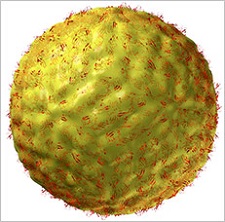 |
| 3-D illustration of a hepatitis C virus particle--Courtesy of NIDDK Liver Diseases Branch/NIH |
Next-generation hepatitis C drugs may be breaking revenue records now, but eventually a vaccine to prevent the disease could cut into the cash cows' market share.
That candidate might come from GlaxoSmithKline ($GSK), whose investigational hepatitis C vaccine just passed an early test, generating strong and broad immune responses not seen before against the transmissible liver disease.
In a Phase I clinical trial conducted at Oxford University, the vaccine proved safe and effective in 15 healthy volunteers, researchers report. Meanwhile in the U.S., investigators have launched a trial to gauge just how well the vaccine might work among a high-risk population of intravenous drug users.
"While this is the first hepatitis C vaccine to reach this stage of clinical trials, it is still at an experimental stage and too early for us to say if and when the vaccine candidate might be available for use," a GlaxoSmithKline spokesperson told FierceVaccines. The results were published in the journal Science Translational Medicine.
GlaxoSmithKline nabbed the vaccine from Okairos in a $325 million buyout in May 2013. The hep C vaccine uses the same technology as the Ebola vaccine that Glaxo also acquired in last year's deal. The vaccine uses a chimpanzee cold virus vector that carries new genes from the target virus--for example, either Ebola or hepatitis C--into a cell where it is dropped off, triggering an immune response in the body.
The positive early results in the hep C vaccine trial could bode well for Glaxo's Ebola vaccine program, which it has accelerated in response to the ongoing outbreak in West Africa.
New hep C treatments like Gilead's ($GILD) Harvoni, as well as a handful of other next-generation therapies lining up for approval, are improving the odds that the virus can be effectively eradicated in patients. But these treatments are expensive and require that patients take medications over a prolonged period of time. A hep C vaccine would be a key piece of the puzzle in preventing the disease in the first place.
- see the study abstract
- get more from Oxford